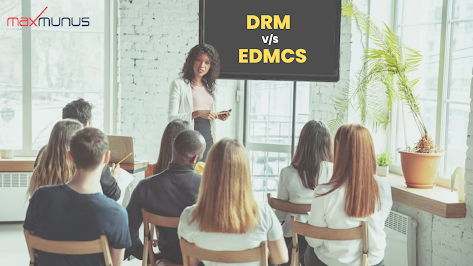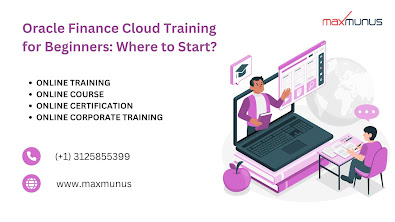DRM vs EDMCS Online Training
Introduction
In the ever-evolving world of data management, organizations are faced with complex challenges related to data governance, consistency, and accuracy. Two powerful tools offered by Oracle to tackle these challenges are Data Relationship Management (DRM) and Enterprise Data Management Cloud Service (EDMCS). This article aims to shed light on the key differences between these two solutions, helping you understand which one suits your needs better. Whether you're considering Oracle EDMCS Training through MaxMunus or exploring corporate training options, this comparison will provide valuable insights.
Understanding DRM and EDMCS
Before diving into the differences, let's briefly define DRM and EDMCS.
Data Relationship Management (DRM): DRM is an on-premises master data management solution by Oracle. It focuses on creating a centralized repository for managing and governing master data, such as hierarchies, reference data, and metadata. DRM is primarily used to maintain data consistency and integrity across various systems and applications.
Enterprise Data Management Cloud Service (EDMCS): EDMCS, on the other hand, is a cloud-based offering that serves as a comprehensive enterprise data management solution. It helps organizations maintain data quality, governance, and consistency in a cloud environment. EDMCS is part of Oracle's EPM (Enterprise Performance Management) Cloud Suite and is designed for modern data governance needs.
Key Differences between DRM and EDMCS
Deployment Model:
DRM: DRM is an on-premises solution, which means it's installed and maintained within the organization's own data center or infrastructure.
EDMCS: EDMCS is a cloud-based service, hosted and managed by Oracle in their cloud environment. This eliminates the need for on-premises infrastructure and provides scalability and flexibility.
Data Accessibility and Collaboration:
DRM: DRM primarily focuses on maintaining data hierarchies and structures. It is less collaborative in nature and does not provide features for business users to directly interact with data.
EDMCS: EDMCS is designed with collaboration in mind. It offers a user-friendly web interface that allows business users to participate in data governance processes. This enables better data alignment with business objectives.
Scalability:
DRM: Scalability in DRM is constrained by the organization's own infrastructure. Expanding capacity may involve significant investments in hardware and software.
EDMCS: Being a cloud-based service, EDMCS provides inherent scalability. Organizations can easily adapt to changing data management needs without worrying about infrastructure limitations.
Integration Capabilities:
DRM: DRM offers robust integration capabilities but typically requires more custom development to connect with various data sources and applications.
EDMCS: EDMCS provides pre-built connectors and integration options that simplify the process of connecting to various data sources and applications, streamlining data governance workflows.
Cost Structure:
DRM: DRM involves upfront capital costs for hardware and software licenses, as well as ongoing maintenance expenses.
EDMCS: EDMCS operates on a subscription-based model, which can be more cost-effective for many organizations as it eliminates upfront capital expenses.
Maintenance and Updates:
DRM: Organizations are responsible for maintaining and updating their DRM instances, which can be resource-intensive.
EDMCS: Oracle handles maintenance and updates for EDMCS, reducing the IT burden and ensuring that organizations always have access to the latest features and security enhancements.
Oracle EDMCS Training and DRM Training through MaxMunus
For individuals and organizations looking to master Oracle EDMCS or DRM, MaxMunus offers specialized training programs. Our Oracle EDMCS Training covers all aspects of EDMCS, including data governance, data quality, and collaboration features. Participants gain hands-on experience and can pursue Oracle EDMCS Certification to validate their expertise.
Similarly, our DRM Training provides in-depth knowledge of Data Relationship Management, including hierarchy management, data governance, and integration capabilities. MaxMunus's expert trainers ensure that you acquire practical skills that can be applied effectively within your organization.
Also Learn: Demystifying Oracle Integration Cloud (OIC): A Comprehensive Guide
Conclusion
In the quest for effective data governance and master data management, choosing between DRM and EDMCS depends on your organization's specific needs and priorities. While DRM is an established on-premises solution with a focus on hierarchy management, EDMCS is a cloud-based, modern data management platform designed for collaboration and scalability. Consider factors such as deployment preferences, data governance requirements, collaboration needs, and cost structures when making your decision. Whether you choose DRM or EDMCS, MaxMunus stands ready to support your training needs, ensuring that you can harness the full potential of these Oracle solutions for improved data management and governance.




Comments
Post a Comment